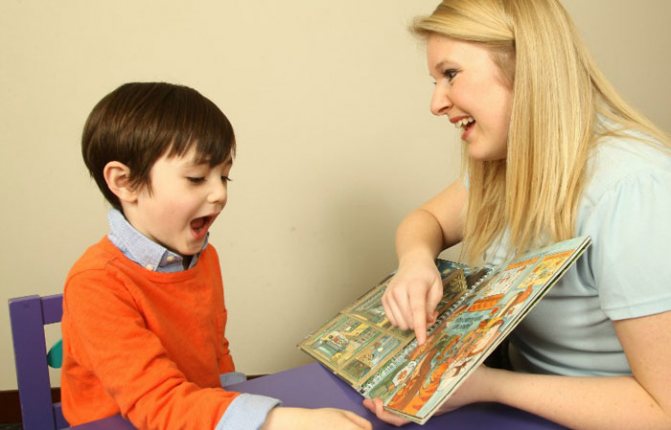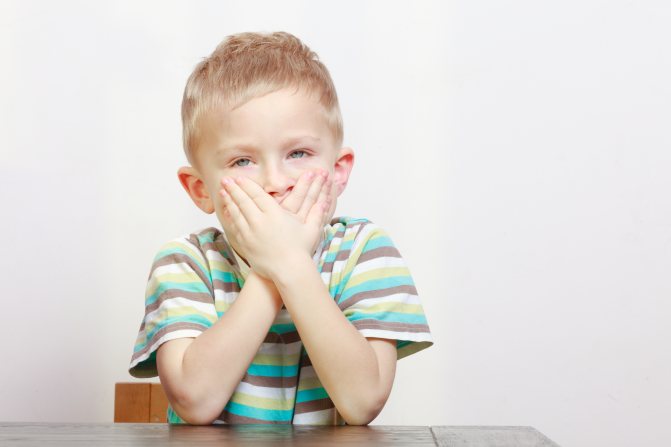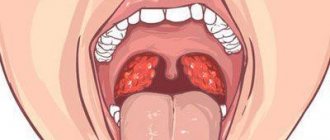Treatment of stuttering in children, the most common speech disorder, is effectively carried out using specially developed techniques and today has a favorable prognosis.
What to do if a child starts to stutter, what stuttering is in children, the causes and treatment of logoneurosis - read about this and much more in this article.
Logoneurosis in children - what is it?
Stuttering, or, in medical terminology, logoneurosis, is a speech defect caused by a deviation in the functioning of the central nervous system. Speech when stuttering becomes uneven, spasmodic, accompanied by convulsive hesitations and multiple repetitions of individual sounds.
With logoneurosis in children, the following symptoms are observed:
- intermittent speech with prolongation of sounds and syllables (mm-m-m-machine, ma-ma-machine), or with forced pauses (m....machine);
- anxiety, restlessness, tension before speaking;
- unconscious movements, for example, frequent blinking, grimaces on the face, as an attempt to overcome stuttering;
- intermittent breathing with too deep a breath or rapid breathing due to excitement.
The coordinated work of the organs of the speech apparatus, respiratory system and voice fails and the fluency of speech is disrupted.
How to understand that a child stutters? Tightness in the face, shortness of breath, tense voice and stress from communication. If there is no tension, but there are simply hesitations in speech due to the desire to voice everything at once, then there is no need to worry.
Causes of logoneurosis in children
Why does a child stutter? The reasons for this may be:
- emotional and information overload;
- past illnesses and complications after them;
- imitation of loved ones who stutter;
- congenital weakness of the organs of articulation;
- heredity;
- trauma during childbirth;
- severe infectious diseases;
- organic disorders in the functioning of the brain.
If an overly emotional, timid, impressionable child began to stutter at 2 or 3 years old, the cause could be severe fear.
The causes of stuttering in children 3, 4, 5 years old, when the processes of speech development and vocabulary replenishment are actively underway, can be information overload. Treatment in such cases necessarily involves organizing a gentle daily routine with prolonged exposure to fresh air, sufficient sleep time, lack of stress and the exclusion of interaction with computer equipment.
Types and types of stuttering in children
If a spasm of the articulatory organs occurs against the background of excitement, emotional stress, and in the absence of stress this does not occur, then this is a neurotic type of logoneurosis. If a child stutters constantly, regardless of external conditions, due to disorders of physical and mental development, then a neurosis-like type of pathology occurs.
Based on the nature of its manifestation, stuttering is divided into types:
- tonic, when due to a spasm of the speech muscles there is a prolonged pause, sounds are difficult to make, the face tenses, breathing is impaired;
- clonic, when sounds and syllables are repeated repeatedly;
- mixed, when there are signs of both tonic and clonic types.
To veil the defect, the child smiles, coughs, and yawns. Or he clenches his fists and stomps his feet in order to somehow overcome the problem. How to help a little person? How to save a child from stuttering? Before starting treatment, it makes sense to talk about the psychological roots of the problem.
Stuttering in children: Komarovsky about the disease
Stuttering in children under 3 years of age does not occur out of the blue. There is always a reason or series of reasons for this. Dr. Evgeniy Komarovsky advises paying attention to the most common causes, such as congenital and acquired. Congenital causes include:
- heredity;
- infections that could affect the development of the fetus before birth;
- fetal injuries during pregnancy;
- injuries during childbirth (hypoxia);
- premature birth;
- the child’s temperament (choleric people are more susceptible to stuttering than phlegmatic people).
There are many more acquired causes and there are many more factors influencing them. Pediatrician Evgeny Komarovsky identifies a number of the most important reasons:
- infectious diseases (meningitis, measles, encephalitis, etc.);
- severe fear;
- restless sleep, fears;
- violence in family;
- character traits;
- emotional stress;
- incorrect speech of parents;
- too emotional joyful event.
Most often, the causes of stuttering lie in the child’s family. If parents often quarrel, yell at the child, use physical punishment, or communicate little with him, all this can cause nervous stuttering.
How does stuttering manifest in children under 3 years of age?
In children aged one to three years, stuttering manifests itself in the frequent repetition of one sound. At the same time, the child becomes very tense and sometimes nervous.
If he was unable to quickly say what he wanted, he may become completely silent and withdraw into himself. Statistically, boys are more susceptible to stuttering than girls. This can easily be explained by the emotional stability of girls.
Boys are more emotional and react stronger than girls to experiences, both negative and positive.
Stuttering can be diagnosed by the child's slow speech. Some children only begin to stutter severely when they are nervous. In a calm home environment, stuttering is almost invisible. But as you grow older, stuttering only gets worse and brings a lot of trouble. At school, this can provoke negative attitudes from classmates, isolation and difficulties in communicating with peers.
The alarm should be sounded when pauses in speech amount to more than 12% - this is a clear sign of stuttering. In this case, you should not think that it will go away on its own. Stuttering will never go away on its own. You immediately need to show the child to specialists: a speech therapist and a neurologist.
And start appropriate treatment without delay. The sooner you start, the greater the likelihood of getting rid of this disease forever.
According to research, children from one to three years of age respond best to comprehensive treatment and get rid of stuttering in the shortest possible time.
Treatment according to Komarovsky
Dr. Evgeny Komarovsky strongly recommends seeing a good speech therapist at the first signs of stuttering. Only he can determine the degree of stuttering in children from one to 3 years of age and prescribe the correct treatment. In addition, Evgeny Komarovsky gives a number of useful recommendations for parents, which we will discuss later in the article.
So, treatment should begin by identifying the cause of stuttering, and, if possible, try to eliminate it. Speak slowly and pronounce each word clearly. Practice speaking with your child only while exhaling.
This is a very useful practice that is used in speech therapy.
Try to limit your child from new information, exclude TV viewing from the schedule altogether, watch only neutral cartoons, and no more than 10 minutes a day.
Try not to have “adult” conversations in the presence of children, even if it seems to you that the child is passionate about the game and he is not listening to you.
If you notice that your child begins to stutter in the presence of strangers, limit communication with strangers to a minimum. In order not to provoke seizures, the baby must be completely calm.
Replace active, screaming, running and jumping games with drawing, modeling, and construction toys. All games should be calm and non-aggressive.
One of the important procedures during treatment is baths. According to Evgeny Komarovsky, water procedures have a very beneficial effect on the general mental state of children. Therefore, give your child a bath as often as possible. While swimming, come up with relaxing games, for example, wash all the toys, launch boats, blow soap bubbles.
Exercise against stuttering in children drawing
Spend more time outdoors and do breathing exercises with your baby. Review your family's diet. Include more fermented milk products in your food, sea fish, dried fruits. All these products are rich in vitamins and microelements, which have a beneficial effect on speech development.
Watch your child's posture; the back should be straight and the chin slightly raised.
If you have back problems, such as stoop or scoliosis, which in turn can put pressure on the diaphragm and lungs.
Because of this, the amount of air in the lungs, which is so important for correct and full speech, is limited. In such cases, you need to consult an orthopedist, who will most likely prescribe a course of massage.
Self-administration of medications is excluded in this case. Singing songs with children is very useful, because stuttering does not appear while singing. Singing trains the lungs, which is very important during treatment.
The main point during treatment is love and affection. At the slightest opportunity, hug your baby, kiss, praise him for every achievement. It has been proven that parental love works wonders during the treatment of children.
All of the above recommendations should be strictly followed for several weeks or about a month. If the child gets better, then we continue in the same spirit until complete recovery. Then you can go back to your usual way of life without any special restrictions. If progress is not noticeable or gets worse, you should immediately contact a speech therapist and neurologist.
Stuttering in children from one to three years of age is quite an unpleasant phenomenon, especially for a child who is very worried about his failures. Just don’t get discouraged and get too hung up on it.
This is not a problem now. With a highly qualified specialist, stuttering can be treated within 6 months to a year.
Although parents will also have to put in a lot of effort and be very patient during treatment.
"Tics and Stutters"
These two diseases may have a nervous cause. A well-known neurologist in his interview will tell you how to correctly diagnose the cause of the pathology and begin treatment based on it.
Source: https://LechimDetok.ru/nervnaya-sistema/zaikanie-u-rebenka-3-let-komarovskij-9426.html
Psychosomatics of logoneurosis in children
Psychologists say that methods of raising a child in a family can influence the appearance of speech problems. They are associated with types of child psychology:
- Hysterical. This is the type when a child can do anything. He is pampered and his every wish is fulfilled. Difficult times come when you have to “go out into the world,” for example, go to kindergarten and be like everyone else. Stress can trigger stuttering.
- Neurasthenic. In this case, the child is suppressed due to inconsistency with the ideals that the parents placed on a pedestal. Neglect, unwillingness to take into account his opinion, humiliation of dignity - such psychological pressure can cause logoneurosis.
- Psychasthenic. Parental overprotection and complete control by them makes the child insecure and timid. Communication with peers is difficult for him. Such a child may begin to stutter.
How to treat stuttering in a child: specialists and methods
The child began to stutter at 3-4 years old, and began to stutter at 6-7 years old. What to do? Is it possible to cure stuttering and how? Who treats stuttering in children? Let's go in order.
What to do if a child stutters? With an integrated approach, stuttering can be successfully corrected! To do this, you need to undergo an examination to determine the cause and begin treatment in a timely manner.
- The speech therapist will eliminate disturbances in the functioning of the articulatory apparatus, teach the correct pronunciation of sounds, and correct the smoothness and correctness of speech.
- A psychologist will identify the cause of the disease, help in overcoming fear, anxiety, excitement, and teach the correct attitude to stressful situations.
- The neurologist will prescribe appropriate therapy to normalize the functioning of the nervous system.
Modern methods of treating the disease include corrective and therapeutic measures.
Stabilizing the emotional state and bringing the nervous system into balance are the main points in neurotic stuttering. Tablets and medications in the form of sedative herbal preparations, hypnosis, massage, as well as breathing exercises and exercises for stuttering, agreed upon with a speech therapist, which you will regularly perform at home - all this is real help for your child.

In the case of neurosis-like stuttering, therapy for brain disorders is prescribed, which is aimed at restoring mental processes. The use of tranquilizers and antispasmodics, work with a psychotherapist and speech therapist - this is the complex of treatment.
Treatment for stuttering
Treatment for stuttering is always complex, and it should be started only after undergoing a comprehensive examination. If doctors decide that the child has a neurotic type of stuttering (logoneurosis), then the main specialist with whom you will have contact will be a child psychologist. Its main tasks will be teaching relaxation methods, relieving muscle and emotional tension, increasing the child’s emotional resistance to stress, teaching parents how to effectively interact with the child, taking into account his properties of the nervous system, choosing optimal educational measures, etc. Also, most likely, a reception will be necessary pharmacotherapy in the form of drugs that calm and relieve muscle spasms, which a neurologist can choose correctly. Of course, you will also need to work with a speech therapist. In case of neurosis-like stuttering, it is more necessary to cooperate with a speech therapist-defectologist, because this type of stuttering requires mostly speech therapy assistance, which should be regular and long-term (at least a year). The main goal of a speech therapist is to teach a child to speak correctly. There will also be dynamic observation by a neurologist, who will most likely prescribe long-term complex drug treatment, which, if ignored, will not crown the speech therapy work with success. Psychotherapeutic assistance in this case does not play a leading role.

Treatment of stuttering in adolescents
Teenage children are also susceptible to this disease. Hormonal changes in the body, an unstable psyche, and revaluation of values make the body vulnerable. Logoneurosis can aggravate the psychological problems inherent in this age and cause complexes.
To cure stuttering in a teenager, it is also necessary to create a unified team of medical specialists, parents and the person growing up to jointly overcome this speech disorder.
The following recommendations can help a teenager get rid of stuttering on his own as additional measures:
- Sing. You won't be able to stutter while singing. Try to do it with pleasure.
- Get creative. Limit activities that require active mental activity. Meditation, yoga, and travel are also useful.
- Keep a diary. This will give you the opportunity to think, express your thoughts in writing, and not out loud, in a calm environment. A mental monologue without stuttering will help in overcoming a speech disorder.
- Master breathing exercises, learn to breathe smoothly and measuredly. This will help your speech become the same.
Go ahead, find the strength to cope with the problem, it can be done.
Our children, regardless of age, are dear to us. Stuttering is a problem. But it is solvable and surmountable. Patience, faith in success, and most importantly, boundless love for your child can work miracles!
Other methods to get rid of stuttering
In order to get rid of such a serious illness as stuttering, it is necessary to use all available methods. Above, I tried to outline in the form of advice what needs to be done.
Here are a few more ways to combat stuttering, which, if desired, you can also apply, either with the help of specialists or on your own:
- Acupressure;
- Physiotherapeutic procedures include: mesodiencephalic modulation; electrosleep; magnetopuncture;
- Treatment with decoctions, infusions and tinctures;
- Devices and computer programs.










